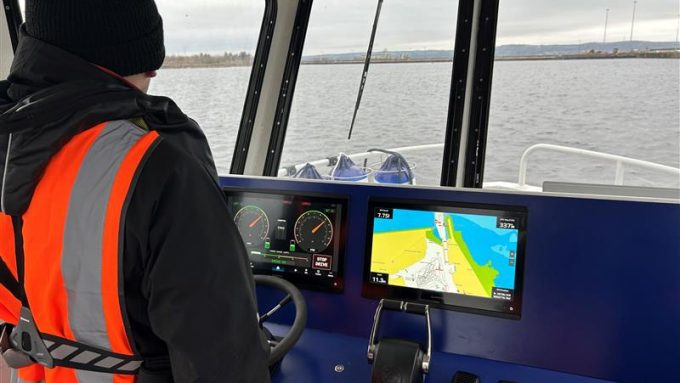
TRIG support helps maritime innovator develop fuel saving sail for ships


Design engineer George Thompson has sailed the oceans and been part of a British team competing in the America’s Cup.
Now the entrepreneur has developed a new wind propulsion system for commercial shipping that promises to reduce fuel consumption and associated emissions by a third. Next month, the product known as AirWing is set to be trialled on a 130m long cargo vessel travelling from Canada to Europe to prove the technology works and delivers benefit.
AirWing is designed to be a rigid sail – standing 20m tall – with up to three ‘wings’ set to be installed on the deck of a ship. They are made from lightweight composite material and produce thrust to a vessel when air passes over a series of integrated fans; reducing the need for power to come from an engine.
The technology, developed by George’s firm GT Wings, received £30,000 two years ago from the Transport Research and Innovation Grants (TRIG) programme, which is delivered by Connected Places Catapult on behalf of the Department for Transport.
Funding was used to develop the product to a point at which it could be approved by a regulatory compliance body.
“TRIG has been extremely helpful in helping us gain approval in principle for the product, which verifies the wing is safe and operational in a real-world environment.”George Thompson of GT Wings
He adds that since the firm’s involvement with TRIG finished, it secured a Government grant from the Clean Maritime Demonstration Competition and £1.25 million in private investment.
“The Catapult also provided us with business coaching and access to some really good networking events that were very helpful in growing the company,” he continues.

Enjoying sailing from an early age
George’s passion for sailing began as a child, when he took dinghies out across lakes, before progressing to sailing off the Solent coast and eventually taking part in races across the English Channel. He studied naval architecture at the University of Southampton, before working as a deck hand for a year on a sailing boat that travelled across the Atlantic and Pacific oceans.
He returned to the UK to take a job with commercial sporting team Land Rover BAR (Ben Ainslie Racing) to support its entry into the America’s Cup Challenge, working alongside systems engineers to improve a yacht’s performance.
George left to join a yacht design company in Hampshire, before returning to join BAR Technologies – a spin-off from Ben Ainslie Racing – as a design engineer involved in the development of its new ‘WindWings’ propulsion system.
Three years ago, he founded GT Wings, first as a consultant and then to take forward his AirWing idea for commercial shipping. His company now employs nine full-time staff including senior engineers, naval architects and simulation specialists.
“Shipping accounts for up to 3% of global CO2 emissions; and we wanted to make an impact by finding a way of reducing the carbon emissions of the global fleet. Wind propulsion is the best solution.”
He adds that development and testing of the new AirWing is both “very exciting and scary at the same time. The best thing will be seeing it on a vessel working well and saving a lot of fuel. The hope then is to start selling it to ship owners around the world.”
Apply to attend our upcoming TRIG Showcase and Networking event in Birmingham (23 October).
Find out more about the Transport Research & Innovation Grants programme.





